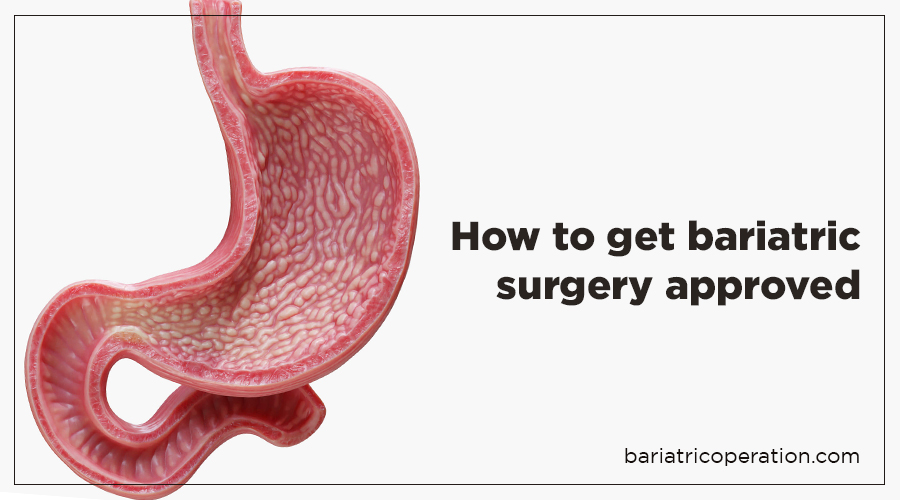How to get bariatric surgery approved
For those battling obesity and the related health problems, bariatric surgery has the potential to change their lives. Knowing how …

In recent years, bariatric surgery has grown in popularity as a feasible weight-loss option for people who battle with their weight. In order to assist people reach a better weight and lifestyle, a surgical operation is performed that modifies the digestive tract. The last option for many people who have tried dieting and exercise without success is bariatric surgery. It is a severe surgery with potential hazards and problems that should not be handled carelessly. However, for those who struggle with obesity and related illnesses, it can be a life-changing treatment when done properly and with the right follow-up care. You should examine the potential dangers and benefits of having bariatric surgery and talk to your doctor about it if you’re thinking about it.
An obese person may have bariatric surgery, which is typically done to assist them reduce weight. While the operation is frequently performed to address extreme obesity, it is also done on persons who have a body mass index (BMI) within a specified range and are at risk for heart disease or diabetes. A skilled bariatric surgeon, who specializes in obesity surgery rather than being a general surgeon, performs bariatric surgery, also known as metabolic surgery. Gastric bypass, gastric sleeve, duodenal switch, and small gastric bypass are the four different types of bariatric surgery. These treatments are used to assist patients in losing weight and keeping it off. The procedures change the digestive tract to increase satiety while consuming fewer calories and food. One of two procedures—an open procedure or a laparoscopic technique—is often used for bariatric surgery.
A fairly serious procedure, bariatric surgery is not suitable for everyone. The American Society of Metabolic and Bariatric Surgery (ASMBS) has created precise standards for identifying patients who are suitable candidates for bariatric surgery. Those who are morbidly obese (body mass index 40 or above) and/or have a specific ailment connected to obesity Candidates for bariatric surgery include those with resistant obesity who have tried numerous weight loss methods without success and who are at a high risk of acquiring conditions that could be fatal, such as diabetes, heart disease, and liver disease. If you satisfy the following requirements, you are often an excellent candidate for bariatric surgery: – You are at least 18 years old. – You have the capacity to commit to long-term follow-up and lifestyle modifications. – You’ve tried other weight-loss strategies without much luck. – You have a BMI of 35 or above and/or a major health condition linked to obesity.
The 1930s saw the first cases of bariatric surgery. Since then, there have been numerous advancements in the profession, and surgical techniques have improved to make them safer, more efficient, and more widely available to patients. A tiny pouch is made at the top of the stomach during a gastric bypass treatment to reduce the amount of food that may be consumed at once. The remainder of the stomach is then reattached to the little pouch, enabling the food to move normally through the remainder of the digestive system. It has been demonstrated that the operation causes the patient to consume about 50% fewer calories. The majority of the stomach is removed during an open procedure known as a gastric sleeve, with only a very little “sleeve” section of the organ remaining. The patient eats less after surgery since their capacity for food consumption is reduced. Up to 70% less calories are thought to be consumed. The upper portion of the stomach is connected to the lower segment of the small intestine by a procedure known as a duodenal switch. By reducing the amount of food the patient may eat at once, the procedure also lowers the calorie content of the diet. In a mini gastric bypass, a little section of the stomach is stapled back to the small intestine during a laparoscopic procedure. The procedure decreases both the quantity of food a patient can eat at one time and the number of calories in that food.
A major procedure with serious hazards is bariatric surgery. These dangers must be evaluated against the potential rewards, and they should only be taken into account if all other weight-loss options have been tried and failed. When it comes to weight reduction surgery, there is no one-size-fits-all solution, and each person should examine the potential advantages of the treatment in light of their own medical background and state of health. The potential advantages of bariatric surgery include assisting in the reduction or elimination of obesity-related illnesses like type 2 diabetes (T2DM) or hypertension, enhancing self-esteem, and assisting people in leading healthier lives.
You must go through a comprehensive medical checkup and psychological assessment to see if you are a good candidate for bariatric surgery before you have the procedure. A physical examination, blood tests, urine tests, and an electrocardiogram are all part of the evaluation (EKG). Anemia, liver and renal function, blood sugar level, blood lipid profile, and HBA1C for T2DM patients are all examined during the blood test. The urine test looks for infections like HIV and hepatitis as well as proteinuria, or blood in the urine, hematuria, or blood in the stool (for colorectal cancer). The heart is examined for any anomalies using the EKG. The psychological assessment is done to see whether you have any emotional or psychological problems that might make it difficult for you to take medications, follow a healthy diet, or exercise following surgery. Based on your lifestyle and other criteria, it also helps to assess if you are a good candidate for the procedure.
To achieve the best results and prevent the recurrence of obesity-related illnesses, you will need to adhere to a rigorous diet and exercise regimen after the surgery. The diet plan will change depending on the kind of surgery you have. This is crucial because this is the time when you will experience the best outcomes and benefits. If your diet is deficient in certain nutrients, you will also need to take some drugs, such as vitamin and iron supplements. To keep an eye on your health and development, you will also need to schedule routine follow-up sessions with your doctor.
Kathie Hamilton was one patient who underwent bariatric surgery and saw notable results. Kathie has been trying unsuccessfully to lose weight for years despite using a variety of techniques. She was on disability because of her deteriorating health, which prevented her from working. She was determined to try bariatric surgery after learning about it. After a successful surgery, Kathie was able to stop receiving disability benefits. She is now able to work full-time and has reclaimed control over her life. The success of Kathie’s procedure serves as evidence of this. Jane, a different patient, has struggled with her weight for many years. She tried diet after diet, and in the past she was on the verge of having gastric bypass surgery before being told not to. She was advised to wait till she was 40 years old since she was too young. But when she hit 40, she made the decision to proceed with the procedure. Jane had a successful operation, and she is now a healthy weight. She has been able to rebuild her life and is even considering dating for the first time in a long time because she is no longer self-conscious about her appearance. She is content and confident with her life.
The price of bariatric surgery will vary depending on the procedure that is done and the kind of institution where it is done. In order to get the greatest deal on the kind of surgery you require, it is crucial to consider all of your options and shop around. On the ASMBS website, you can find details regarding various kinds of bariatric surgery. You will have to pay for the procedure out of pocket even if your insurance covers it. Before scheduling a surgery appointment, be sure you are informed of your insurance coverage since every insurance plan is different. The cost of the surgery, if it is not covered by insurance, may range from $18,000 to $35,000.

For those battling obesity and the related health problems, bariatric surgery has the potential to change their lives. Knowing how …

Congratulations on being brave enough to choose bariatric surgery to improve your health and quality of life. This life-changing process …

Bariatric surgery, also known as weight loss surgery, has grown in popularity as an option for those battling obesity. It …

Don’t abandon hope if you’re considering bariatric surgery but lack insurance coverage. Without insurance, it is still possible to pay …

If you or someone you know is struggling with type 2 diabetes and considering bariatric surgery as a treatment option, …

Bariatric surgery, commonly known as weight reduction surgery, has received a lot of attention in recent years as a possible …

Bariatric surgery, often known as weight loss surgery, is a life-changing treatment that may help people who are overweight lose …

For people suffering from obesity, bariatric surgery, commonly known as weight loss surgery, has been a game changer. The treatment …

Are you looking into getting bariatric surgery to assist you in losing weight and improving your overall health? If that’s …

A reader’s experience of reading a blog post that the author has written on the procedure for bariatric surgery can …